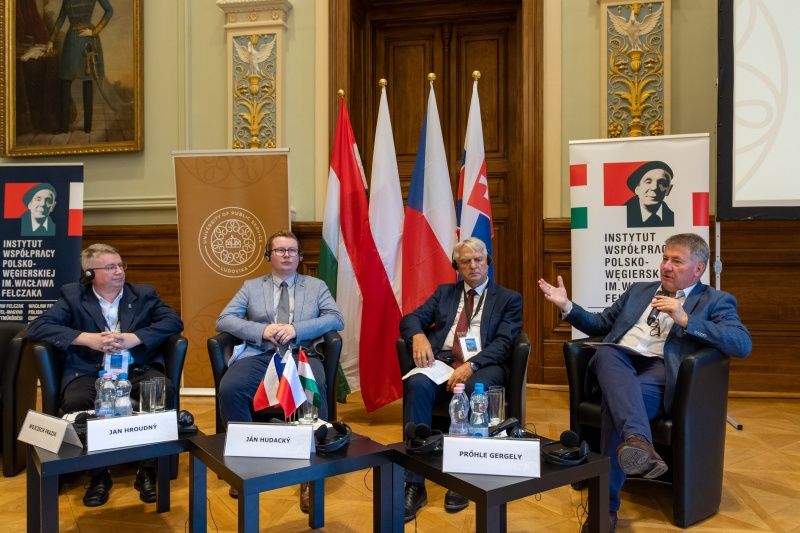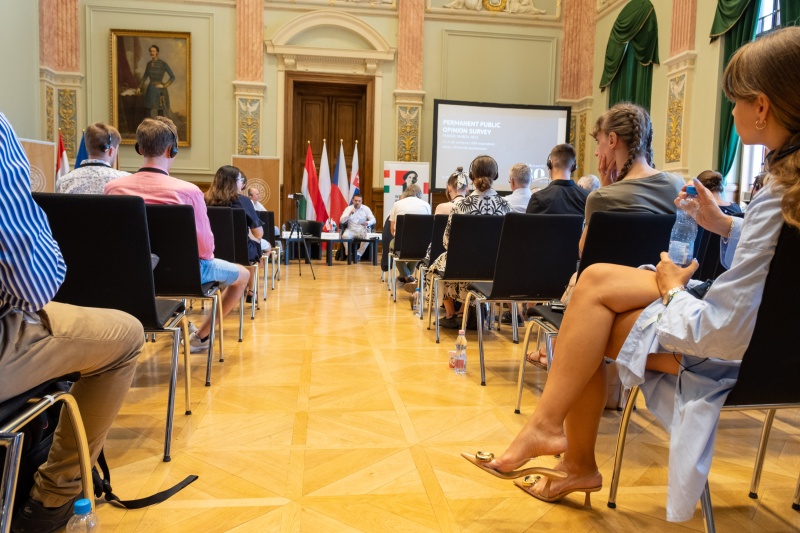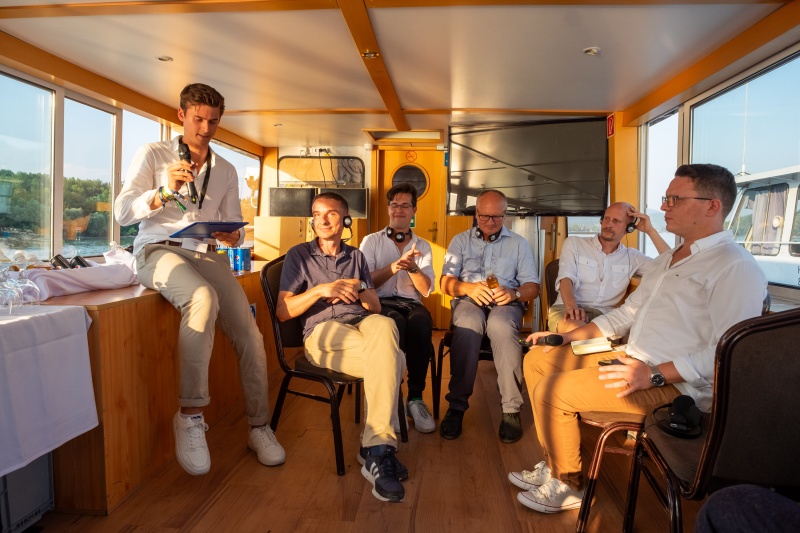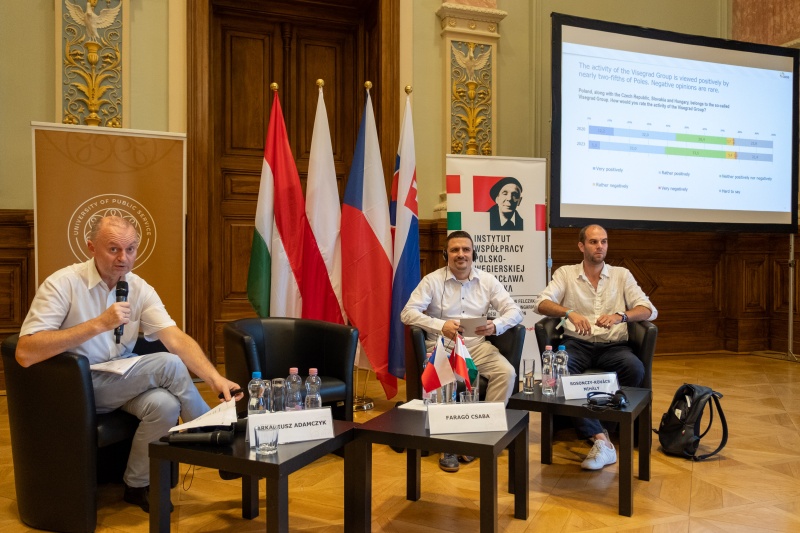About 150 people took part in the official inauguration of the first edition of the Visegrad Summer Academy. Young leaders from Poland, Hungary, the Czech Republic and Slovakia - as well as experienced politicians and diplomats, outstanding scientists and well-known publicists from four countries in the region, discussed together the most important problems regarding the history, present and future of the Visegrad Group countries. The grand inauguration of the Visegrád Summer Academy, a collaborative effort between the Wacław Felczak Polish-Hungarian Cooperation Institute and the Ludovika University of Public Service (LUPS), was held with great pomp and ceremony on August 25th. The prestigious event unfolded in the magnificent Grand Hall of LUPS.

Photo by Tibor Tóth
In her address to the attendees of the international conference held in Budapest, President Katalin Novák underscored the significance of collaboration among Poland, Hungary, the Czech Republic, and Slovakia during the tumultuous times of the conflict in Ukraine. She expressed her optimism for the deepening of the longstanding Polish-Hungarian friendship. Furthermore, she observed that the substantial presence of young leaders at the Visegrad Summer Academy offers assurance for the continued growth of strong relationships within the Visegrad Group in the future. "This is why I consider the role of the Felczak Institute very important and why I've been following its activities from the beginning. Events like this one offer young people the opportunity to exchange ideas about common values and differences and points of contention" - President Katalin Novák said. She also noted, as the nation's first female President, her delight in witnessing a growing representation of women among the program's participants. "Let us combine our efforts to steer our ship toward a safe harbor," declared Katalin Novák.
The Visegrad Summer Academy attendees were greeted with enthusiasm also by Ákos Mernyei, the Director of International Affairs at the University of Public Service. In his welcoming address, he highlighted the remarkable potential of collaboration within the Visegrad Group, comprising Poland, Hungary, the Czech Republic, and Slovakia. Mernyei passionately emphasized that together, these nations can unlock opportunities and achieve ambitious objectives that would be challenging, if not impossible, to reach on their own. "The Visegrád cooperation is aimed at attaining outcomes that would be challenging to accomplish individually or would demand significantly greater effort. As the current presiding country of the V4, the Czech Minister of Foreign Affairs recently underlined that our nations share a region with numerous common challenges. I would take it a step further: our destinies are interwoven, both in terms of geography and history, as well as economically and culturally," he eloquently expressed. He went on to emphasize that our youth are the guarantors of our country's future, and gatherings such as the V4 Summer Academy serve as a means to bring together the younger generation and create opportunities for fostering cross-border relationships.
In alignment with these sentiments, Dr. Maciej Szymanowski, the Director of the Felczak Institute, echoed the significance of the youth. "As you finish your studies, you will mold the reality around us. Our nations will evolve into what you collectively shape them to be," he affirmed. The Wacław Felczak Polish-Hungarian Cooperation Institute was founded in 2018, following the joint initiative of Prime Ministers Viktor Orbán and Jarosław Kaczyński. Its primary mission is to foster and strengthen the bonds of friendship between Hungary and Poland. The institute is dedicated to facilitating the growth of the relationship between these two nations, fostering mutual understanding, and bolstering their competitiveness.

Photo by Tibor Tóth
Minister Kuchciński: the Visegrad Group countries need their own international strategy, without relying solely on the West.
Minister Marek Kuchciński, who remotely connected with the leaders in Budapest, warned during the debate that individually, the Central European countries won't achieve much. Acting alone, they can only be "further played by the West" and exposed to Russian imperialism. Mr. Kuchciński also argued that "every war, including the one in Ukraine, should bring Central European states closer together rather than drive them apart." The Chief of the Prime Minister's Office asserted that Poland, Hungary, the Czech Republic, and Slovakia should develop their own joint strategy of cooperation, without being overly influenced by the divided European Union on this matter.
Minister Marek Kuchciński underscored that it has been a challenging nine years since Russia's aggression began in the east. Poland, along with other countries in the region, has felt the repercussions, including high inflation and the arrival of millions of Ukrainian refugees. In response to the Russian threat, Poland has bolstered its defense spending to a remarkable 4 percent of its GDP and erected a robust physical barrier along the Polish-Belarusian border. He also pointed out that the Visegrád Alliance had accomplished one of the world's most remarkable economic growth rates before the conflict in Ukraine erupted, with a growth rate that was 2-3 times faster than that of Western Europe. This positioned the alliance as a crucial partner for Germany and France.
"The West has not faced a direct threat from Russia, never enduring Soviet occupation, and often failing to fully grasp the intricacies of Central Europe. Consequently, our situation necessitates a broader approach than the Visegrad Group alone can provide. What we require is a Central European collaboration with its own strategy for mutual cooperation and a comprehensive plan for revitalizing the European Union," emphasized Minister Kuchciński, a message he consistently reinforces across social media platforms.
Source: Facebook
Minister Tibor Navracsics: There is a need for deeper cooperation within the V4
Hungarian Minister of Regional Development Tibor Navracsics concurred with Marshal Marek Kuchciński's arguments, emphasizing the need for much stronger cooperation within the Visegrad Group (V4). During an international conference organized by the Felczak Institute, Minister Navracsics noted that Hungary is emotionally the most committed to cooperation within the Visegrad Group. He explained that the Czech Republic and Slovakia are pragmatic and geopolitical members of the V4, while Poland, as a potential European superpower, calls for pragmatic cooperation in the region based on shared values.
The Hungarian government official highlighted that despite some disagreements within the Visegrad Group due to differing approaches toward Ukraine after the Russian aggression, Poland, Hungary, the Czech Republic, and Slovakia can still collectively address crucial issues, such as protecting their countries from the influx of illegal immigrants.
Minister Navracsics also noted that "the friendship between the Visegrad Group countries and the development of relations among the nations of Central Europe are based on science, education, and culture." During the discussion, Tibor Navracsics highlighted that the common goal of Poland, Hungary, the Czech Republic, and Slovakia is to strengthen trust in these areas, which simultaneously serve the interests of all four nations and the interests of Europe as a whole. Tibor Navracsics emphasized the importance of timelines, hinting at the need for the establishment of medium-term cooperation between Eastern countries and the Visegrad Group.
Source: Facebook
Polish-Hungarian friendship tree
Following the event, Ákos Mernyei and Maciej Szymanowski planted the Polish-Hungarian friendship tree in the garden of Orczy Road College.

Photo by Tibor Tóth
Destined for cooperation
To cultivate relationships in the present and future, it's crucial to honor our shared history. In Budapest, a debate among historians was held with this objective in mind. The program continued with a panel discussion titled "Visegrád – Bridges and Crossroads in the Past and Future," featuring Polish historian, a scholar from the Jagiellonian University and a staff member of the Institute of National Remembrance Wojciech Frazik, Czech representative Jan Hroudný, Slovak politician Ján Hudacký, moderated by Gergely Prőhle, Director of the Institute for Strategic Studies at LUPS.
In his introductory remarks to the discussion, Gergely Pröhle underscored the immense role of personal friendships and acquaintances in fostering cooperation among the countries in the region. He believed that direct contacts enable open debates on disparities and sensitive historical issues. Gergely Pröhle also emphasized the significance of jointly caring for history and collaborating in the realm of culture. The speakers noted that in the nations of Central Europe, there is a deeply rooted sense of distrust towards neighbors. However, they emphasized that the countries in the region share common values stemming from their Christian cultural heritage.
Ján Hudacký from Slovakia stressed the significance of how the older generation imparts knowledge and motivates the younger generation. He also pointed out the so-called "new European values" promoted by Brussels elites, to which the governments of Hungary and Poland consistently object, while the Czech Republic and Slovakia take a more pragmatic approach with some degree of compromise.
However, the panelists agreed that Poland, Hungary, the Czech Republic, and Slovakia are "destined for cooperation." They also concurred that the Visegrad Group has weathered many crises and has proven effective in achieving strategic political objectives (such as NATO and European Union membership). To pursue further goals, they believe it would be necessary to deepen integration and establish shared institutions, such as a V4 parliamentary forum, a Visegrad investment fund, or a joint youth organization. Dr. Wojciech Frazik, a historian and a student of Professor Wacław Felczak, emphasized the crucial issue of Central European sovereignty. Will Central Europe be able to control its own future, or will the control over its destiny fall into the hands of a European "hegemon"? This question remains at the heart of the discussion.
Conference participants also had the opportunity to visit the Mathias Corvinus Collegium (MCC) and the Parliament.

Photo by Tibor Tóth
On Friday, the discussion also revolved around how to collectively advocate for the interests of the region within the European Union. Participants in this conversation included János Bóka, Minister for EU Affairs (HU), Jaroslav Kuchyňa, an analyst from the CEVRO Institute (CZ), and Pál Csáky, a former Member of the European Parliament (SK). Ákos Mernyei, the Director of International Affairs at the University of Public Service (HU), moderated the debate.

Young leaders from the Visegrad Group countries attentively followed the subsequent panels addressing the region's most pressing issues. Photo by Tibor Tóth
During the three-day international conference, there was also a discussion among journalists about the future of the Visegrad Group. Taking part in the debate on board a ship sailing to Budapest were editor Jozef Majchrák (SK), editor Mátyás Zrno (CZ), editor Paweł Lisicki (PL), and Hungarian columnist Mátyás Kohán.

Photo by Tibor Tóth
On the final day of the Visegrad Summer Academy, an expert discussion on security policy and foreign policy strategy took place. The participants included Hungarian Brigadier General Imre Porkoláb, Commissioner for Defense Innovation, who was elected as Deputy Head of the Board of Directors of the NATO-led Defence Innovation Accelerator for the North Atlantic (DIANA) in December 2022. Poland's perspective was presented by Professor Andrzej Zybertowicz, an advisor to President Andrzej Duda, while the Czech Republic was represented by analyst Jaroslav Kuchyňa from the CEVRO Institute. The discussion was moderated by Colonel Zoltán Jobbágy from the Faculty of Military Science and Officer Training at NKE (National University of Public Service).

Photo by Tibor Tóth
Imre Porkoláb, a brigadier general overseeing defense innovation, emphasized the importance of strategic foresight in defense. He pointed out that previous methods, especially in procurement, have proven to be ineffective, highlighting the need for a more forward-looking approach. He stressed the importance of strategic cooperation with the Visegrád Group (V4) and NATO in the fields of security, defence and foreign policy.
Andrzej Zybertowicz, a sociologist and analyst with eight years of experience as an advisor to the Polish President, articulated several key points:
-
Poland supports the principle of subsidiarity within the European Union, emphasizing the ineffectiveness of the Union's monolithic development.
-
Poland strongly advocates for the Three Seas Initiative, which it proposed in 2016. This initiative primarily aims to enhance economic cooperation among 12 EU countries located around the Adriatic, Baltic, and Black Seas.
-
Zybertowicz suggested that Germany alone cannot guarantee stability and security within the European Union, and he recommended that the United States reevaluate its security policy.
-
In light of the complex situation in Ukraine, Zybertowicz noted that Poland has significantly increased defense spending, reaching levels not seen since the communist era.
-
Both Poland and Hungary proactively procured defense assets well before the outbreak of the war, showcasing their commitment to addressing security challenges.

After the roundtable discussion, Arkadiusz Adamczyk from the Warsaw-based Wacław Felczak Polish-Hungarian Cooperation Institute, Csaba Faragó from the Századvég Foundation, and Mihály Rosonczy-Kovács from the Nézőpont Institute delved into the political, cultural, and other relations between Hungary and Poland based on public opinion surveys. Experts highlighted that there is no fundamental difference between the Hungarian and Polish viewpoints. Both countries condemn Russian aggression and are keenly interested in seeing a sovereign and free Ukraine. Photo by Tibor Tóth

Despite the challenges posed by various circumstances, Marek Natusiewicz from the Wacław Felczak Polish-Hungarian Cooperation Institute emphasized the need to seek common ground rather than divisions. He stressed the significance of ensuring that this war becomes the last, both at the international and interstate levels. Natusiewicz also highlighted the example of his own city, where 600,000 Poles and 300,000 Ukrainians reside, placing strong emphasis on their integration efforts. Photo by Tibor Tóth
(J)
Read other reports from this event:
